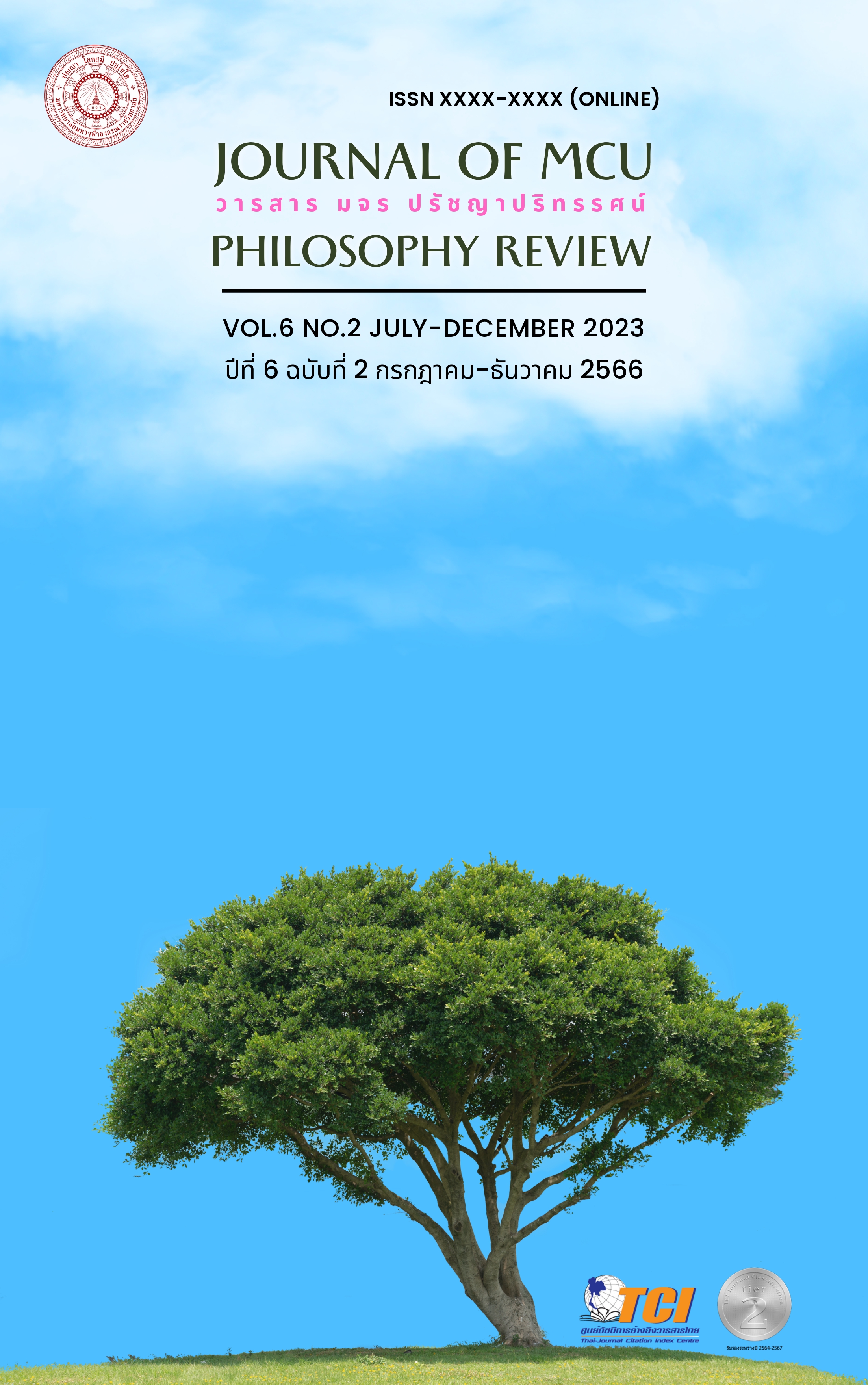A Pattern in Forming Ideology and Network of Buddhist Monks from the Cultural Tourism at Four Holy Places of Buddhism
Main Article Content
Abstract
This research article aims: 1) to study the process in forming the ideology and network, 2) to study cultural tourism at four holy places of Buddhism, and 3) to propose a model in forming the ideology and network from four holy places of Buddhism. This is qualitative research done by studying documentaries and in-depth interview of 40 people comprising of Buddhist scholars, Buddhist missionaries, and Buddhist pilgrims. In the research, it was found that the process in forming the ideology and network consists of the procession of building relationship through the creation of mutual goodness to each other and the utilization of religious symbols in preserving the ideology, building certain pagoda and dwelling-place, for instance, in order to remind people of the significance of such ideology whereby the support of network would be sustained. As regards the cultural tourism at four holy places of Buddhism, two types of travel were considerably found: the first is pilgrimage for the benefit of others, the second for the gradual putting an end to defilement. As far as the pilgrimage to four holy places of Buddhism is concerned, it includes the following places, birth, enlightenment, sermon, and passing away. Of these places, they are interconnected reflecting on four kinds of formation on ideology and network: the inspiration on emotion or faith, critical thinking leading to the ultimate reality, exchanging experiencing, providing benefit for others, sacrificing and living simple life, and physical aspect bringing about the protection of Buddhism and culture in living together correspondingly.
Article Details

This work is licensed under a Creative Commons Attribution-NonCommercial-NoDerivatives 4.0 International License.
บทความที่ได้รับการตีพิมพ์เป็นลิขสิทธิ์ของวารสาร มจร ปรัชญาปริทรรศน์
ข้อความในบทความที่ได้รับการตีพิมพ์ในวารสาร ถือเป็นความรับผิดชอบของผู้เขียนบทความ และข้อคิดเห็นนั้นไม่ถือว่าเป็นทัศนะและความรับผิดชอบของกองบรรณาธิการวารสาร มจร ปรัชญาปริทรรศน์
References
พระธรรมปิฎก (ป.อ.ปยุตฺโต). (2543). พัฒนาคุณภาพชีวิตด้วยจิตวิทยาแบบยั่งยืน. กรุงเทพมหานคร:
สหธรรมิก.
พระพรหมคุณาภรณ์ (ป.อ.ปยุตฺโต). (2552). จารึกอโศก (ธรรมจักรบนเศียรสี่สิงห์). กรุงเทพมหานคร:
สำนักพิมพ์ผลิธัมม์.
พระพรหมคุณาภรณ์ (ป.อ.ปยุตฺโต). (2553). จาริกบุญ จารึกธรรม. พิมพ์ครั้งที่ 18. กรุงเทพมหานคร: พิมพ์สวย.
พระพุทธโฆสเถระ. (2560). คัมภีร์วิสุทธิมรรค. พิมพ์ครั้งที่ 12.กรุงเทพมหานคร : ธนาเพรส.
พระมหาสุทิตย์ อาภากโร. (2548). เครือข่าย : ธรรมชาติ ความรู้ และการจัดการ. พิมพ์ครั้งที่ 2. กรุงเทพมหานคร : โครงการเสริมสร้างการเรียนรู้เพื่อชุมชนเป็นสุข.
พระมหาพรชัย สิริวโร, พระมหาขวัญชัย กิตฺติเมธี, ไข่มุก เหล่าพิพัฒนา และเพ็ญพรรณ เฟื่องฟูลอย. (2563). อัตลักษณ์ทางวัฒนธรรมในการท่องเที่ยวอย่างยั่งยืน จังหวัดแม่ฮ่องสอน. วารสารพุทธมัคค์ ศูนย์วิจัยธรรมศึกษา สำนักเรียนวัดอาวุธวิกสิตาราม, 5(1), หน้า 1-14.
พิสิษฐิกุล แก้วงาม. (2559). “วิกฤตเชิงคุณค่าของประชาธิปไตยไทย : ประชาธิปไตยแบบชนชั้นนำ กับความเท่าเทียม (เทียม) ในพื้นฐานตรรกะว่าด้วยการทำประชามติเรื่องความปรองดองในทางการเมือง”. ใน ความหวังกับจินตนาการทางมนุษยศาสตร์. บรรณาธิการโดย คงกฤช
ไตรยวงค์, ธนภาษ เดชพาวุฒิกุล. กรุงเทพมหานคร : สยามปริทัศน์.
แผนพัฒนาเศรษฐกิจและสังคมแห่งชาติ ฉบับที่ 13. (พ.ศ. 2566-2570). 2565,01 พฤศจิกายน). ราชกิจจานุเษกษา. เล่ม 139 ตอนพิเศษ 258 ง, หน้า 1-11.
ธิดารัตน์ มูลลา, สมสุข หินวิมาน. (2556). “การสื่อสารกับการผลิตซ้ำเพื่อสืบทอดอุดมการณ์ผ่านหนังสือฮาวทู”. วารสารบรรณศาสตร์ มศว, 6(2), หน้า 97-98.
สายันต์ ไพรชาญจิตร์. (2555). เอกสารประกอบการสอนโครงการเสริมสร้างกระบวนการเรียนรู้ในงานพัฒนาชุมชน. ภาควิชาการพัฒนาชุมชน คณะสังคมสงเคราะห์ศาสตร์ มหาวิทยาลัยธรรมศาสตร์.
อยุทธ์ เพชรอินทร. (2537). อุดมการณ์ทางการเมืองของพรรคประชาธิปัตย์.วิทยานิพนธ์รัฐศาสตรมหาบัณฑิต, จุฬาลงกรณมหาวิทยาลัย.
จันทรัตน์ มั่นวิเชียร. กระบวนการพัฒนาปัญญาจากการจาริกแสวงบุญ ณ สังเวชนียสถาน 4. วารสารสันติศึกษาปริทรรศน์ มจร, 5(2), หน้า 286-298.
สถาบันโพธิคยาวิชชาลัย 980. (2554). ธรรมวิชัยจากแดนพุทธภูมิ. กรงเทพมหานคร : พิมพ์ดี.
สุนทรี โชติดิลก. (2555). “ความสัมพันธ์ระหว่างภาษากับอุดมการณ์ในวารสาร “อยู่ในบุญ” สุขที่พึงประสงค์ สุขได้ด้วยบุญ”, วารสารมนุษยศาสตร์และสังคมศาสตร์, มหาวิทยาลัยราชภัฏสุราษฎร์ธานี, 4(2), หน้า 168.
Andrew Church. (2004). “Local and Regional Tourism Policy and Power”. in A Companion to Tourism. Edited by Alan A. Lew, C. Michael Hall, Allan M. Williams. Oxford: Blackwell Publishing Ltd.
Carl J. Friedrich & Z.K.brzezinski.(1956). Totalitarianism Dictatorship and Autocracy. New York: Harvard University.
Javier Trevino, George C, Homans. (2006). History, Theory and Method. Oxford: Charles Tilly, Boulder, Paradism Publishers.


